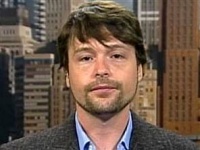Evan Kohlmann
( counter-terrorist) | |
|---|---|
 | |
| Born | Evan Francois Kohlmann 1978 |
| Alma mater | • Georgetown University • University of Pennsylvania |
| Founder of | Flashpoint |
Georgetown University "counter-terrorist" | |
Evan Kohlmann is an American terrorism consultant specialising in the monitoring of websites and providing expert services to media, law enforcement and prosecutors in the United States, United Kingdom and Australia. He ran his own website Globalterroralert.com before working as a consultant for the NEFA Foundation. He frequently serves as a paid expert witness for the prosecution in terrorism trials and has assisted the prosecution in the US Military Commissions system – condemned by human rights groups.[1]
Evan Kohlmann is the founder and Chief Innovation Officer at Flashpoint.
Contents
Own words
Evan Kohlmann is responsible for innovation and product development at Flashpoint.
Dubbed "the Terrorist Search Engine" by New York Magazine, Kohlmann has worked for more than two decades as a private sector intelligence researcher tracking terrorist organisations and extremist groups, in large part through their electronic communications. He holds an unusual combination of expertise both in the subject matter of intelligence analysis, as well as in building automated systems for data acquisition and distillation.
Evan Kohlmann has served at various times as a contract consultant on behalf of the US Department of Defense, the US Department of Justice, the Federal Bureau of Investigation (FBI), the Office of the High Representative (OHR) in Bosnia-Herzegovina, the International Criminal Tribunal for the Former Yugoslavia (ICTFY) at the Hague, the Australian Federal Police (AFP), the UK Crown Prosecution Service (CPS), Scotland Yard's SO-15 Counter Terrorism Command, the Central Scotland Police, West Yorkshire Police, the Swiss Federal Public Prosecutor, and the Danish Security and Intelligence Service (PET).[2]
Doubts about expert witnesses
On 13 May 2008, John Crace wrote in The Guardian:
Last year, Evan Kohlman, a veteran of several US terror prosecutions, gave expert evidence that helped to convict Mohammed Atif Siddique, a British-born Muslim, for internet-related terrorism offences.
But just how expert is expert? Doubts have been cast both in the US and the UK about Kohlman's credentials. "He appears to have risen almost without trace," says David Miller, professor of sociology at Strathclyde University, who is compiling a Spinwatch database of "terrorologists". "With no expertise beyond an undergraduate law degree and an internship at a dubious think-tank, he has become a consultant to the US Department of Defense, the US Department of Justice, the FBI, the Crown Prosecution Service, and Scotland Yard's SO-15 Counter Terrorism Command." Yet this is only half the problem. "The real issue is one of independence: many of the expert witnesses to have appeared for the prosecution have been associated with rightwing or pro-Zionist organisations. Under these circumstances, how can the expertise not be in some way contaminated?"
Calling expert witnesses in legal cases is predicated on the assumption that the evidence given will be objective and factually correct - governed by the principle of professional, scientific neutrality. And many terrorism academics have declined to appear as expert witnesses precisely because they feel their subject does not lend itself to such high levels of impartial scrutiny.
"By its very nature, terrorism is shrouded in secrecy," says Anthony Glees, professor of intelligence and security services at Brunel University. "The only way academics can get inside information is if they have extremely close links either to the intelligence services or to terror groups; and even then there have to be doubts about its accuracy as intelligence reports are often sketchy and contradictory. Any work an academic does must inevitably be then regarded as research-led opinion, which I'm not at all sure meets the standards of evidence and cross-examination required in a court of law. If doctors - just think of those wrongly convicted of child abuse - can't always be relied on as expert witnesses, it's hard to see how academics specialising in terrorism can."[3]
Exaggerating his credentials
In R. v. F (Woolwich Crown Court, 2007) Evan Kohlmann was cross examined on his expert credentials by Geoffrey Robertson QC. He implied that his book was published by Oxford University Press, whereas in fact it was published by Berg Publishers:
- Robertson: Your book is a book described as published by Berg Publishers?
- Kohlmann: It is Oxford University Press, I believe.
- Robertson: That is a false statement, Mr Kohlmann; is it not? Oxford University Press? It was published by Berg?
- Kohlmann: Which is an imprint of Oxford University Press.
- Robertson: No, it is an imprint of Oxford International Publishers, which is not Oxford University Press?[4]
Later Kohlmann referred to his honours thesis as being "over a hundred pages long", although the (double spaced) version that was posted on the Flashpoint website is only 88 pages.
Kabul terror blasts
On 26 August 2021, Evan Kohlmann tweeted that ISIS-K had claimed responsibility for the 2021 Kabul Airport attacks and posted a photo of suicide bomber "Abdul Rahman al-Lowgari who carried out the martyrdom operation near Kabul Airport.".[5]